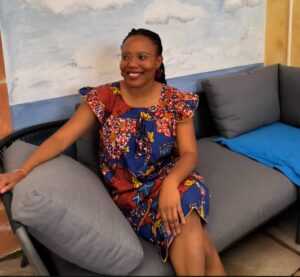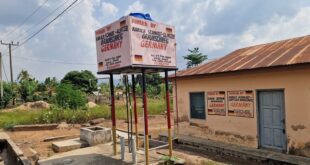
![]()
The family of Sonia Omoroghomwan and Black organisations are demanding a thorough investigation into her death in a Berlin psychiatric hospital, as multiple pieces of evidence contradict the official account of the young woman’s passing, reports Amal Abbass.
![]()
The death of 25-year-old Sonia Omoroghomwan in a psychiatric hospital in Berlin has raised serious questions – not only about the circumstances of her passing, but also about how the authorities handle the deaths of Black people and the systemic violence within mental health institutions, say activists.
Sonia, a young Black German woman, was found unconscious on 22 May 2025 in the bathroom of a locked psychiatric ward of a Berlin hospital (name withheld). She died four days later. A worker in the hospital claims Sonia strangled herself using a scarf attached to a shower fitting. However, her family and a growing coalition of Black organisations say this account does not hold up under scrutiny – and the evidence strongly contradicts the official version.
Conflicting Evidence
Sonia’s family – especially her aunt, who raised her after the early death of her parents – documented significant inconsistencies at the alleged scene of the incident. For example, the bathroom door reportedly could not be locked, contradicting the hospital’s claim that Sonia had “locked herself in”. The shower fitting supposedly used was a thin, unstable side pipe that could not have supported her weight.
Photographs taken in hospital just before her death show disturbing signs of violence: severe bruising around the neck, swollen lips and a heavily protruding tongue – classic signs of forceful strangulation. Moreover, there were no traces of knots, bindings or other indicators of a self-inflicted suicide attempt.
“The alleged suicide took place during the night. I wasn’t informed until the following day, after I came back from work in the afternoon. That’s when they called me – not to explain what had happened – but to ask if they could harvest her organs,” her aunt said. “Sonia was getting better. She was full of life and plans. Her death must not be covered up,” she stated.
For the family, it is clear: Sonia did not take her own life – she was the victim of violence.
Investigations Prematurely Closed
Despite the disturbing evidence, police investigations were discontinued just days after the incident –
– without an independent autopsy,
– without interviewing the family,
– and without reviewing the full case files.
In response, several organisations – including the tubman.network, ISD Bund and Exit Racism Now! – are calling for the case to be reopened and for a truly independent investigation to be carried out by a special commission, with the involvement of international forensic experts.
They also demand the preservation of all relevant evidence, including CCTV footage from hospital corridors, entrances and wards; medical records from 26–28 May; forensic photographs; and the questioning of all potential witnesses, including fellow patients, nursing staff and cleaners. Furthermore, the organisations are calling for a parliamentary inquiry into institutional responsibility and systemic failures.
A Pattern of Deaths in Psychiatric Care
Sonia’s death follows a distressing pattern of unexplained deaths of Black people in psychiatric care – both in Germany and internationally. In 2022, Johanna de Souza died following a restraint in a Munich hospital. In the United States, Irvo Otieno died in 2023 after being violently restrained by hospital staff.
Research consistently shows that Black patients are disproportionately subjected to coercion, mistreatment and a lack of protection in psychiatric institutions. According to a 2023 report by the Initiative of Black People in Germany (ISD), Black people are three times more likely to face coercive measures in German psychiatric facilities. Similar findings exist in the UK, where the NHS Race and Health Observatory reported in 2022 that Black people are four times more likely to be sectioned under the Mental Health Act.
Family Under Pressure – Call for Support
Sonia’s family is facing immense emotional and financial pressure. A dignified funeral and an independent autopsy remain unaffordable. The burial scheduled for 23 June was only halted at the last minute thanks to public outcry. The family also lacks legal representation with expertise in human rights or psychiatric care.
The signatory organisations are calling for donations and support in the form of legal aid, psychosocial assistance and solidarity actions. A crowdfunding campaign is currently being prepared.
Sonia Omoroghomwan was a young woman with a future. She died in an institution meant to protect her. Her death must be fully, independently and publicly investigated – for the sake of her family, and for everyone who seeks care in psychiatric institutions.
A fundraising campaign has been launched by tubman.network e.V. to raise funds to pursue this case and ensure that her family finds the justice they deserve. To support the campaign, click HERE
—
Contact for support and media enquiries:
tubman.network e. V.
frontoffice@tubman-network.org
http://www.tubman.network
WhatsApp: +49 157 77945276
- Amal Abbass is a community organizer and co-founder of tubman.network e.V., a Berlin-based organization committed to justice through memory, resistance and the centering of Black and African voices in public culture.
 THE AFRICAN COURIER. Reporting Africa and its Diaspora! The African Courier is an international magazine published in Germany to report on Africa and the Diaspora African experience. The first issue of the bimonthly magazine appeared on the newsstands on 15 February 1998. The African Courier is a communication forum for European-African political, economic and cultural exchanges, and a voice for Africa in Europe.
THE AFRICAN COURIER. Reporting Africa and its Diaspora! The African Courier is an international magazine published in Germany to report on Africa and the Diaspora African experience. The first issue of the bimonthly magazine appeared on the newsstands on 15 February 1998. The African Courier is a communication forum for European-African political, economic and cultural exchanges, and a voice for Africa in Europe.


































